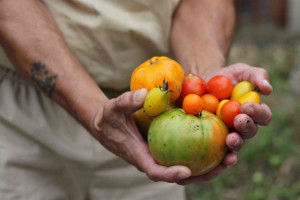5 Things I Learned from Community Table with Garden Time
Garden Time is a non-profit organization based in Rhode Island which provides hands-on vocational training to incarcerated persons.
Their mission is “to create garden programs for incarcerated men and women at the Rhode Island Adult Correctional Institution and elsewhere. Through the processes of gardening, the organization fosters education, inspiration, and empowerment; teaches inmates to grow food for economic and personal self-reliance; and identifies and connects with existing opportunities that enable and encourage permanent re-entry into society.”
They work in several RI prisons and the Training School side by side with the participants to create and maintain gardens. We heard from co-founder and garden educator Kate Lacouture, a landscape architect and self-described “garden activist” who shared information and stories about her program with the group.
What we learned from Kate’s presentation is that gardens can offer us more than just food. Here are 5 things that I learned about what the Garden Time program offers:
- Empowerment
People who are incarcerated are not a homogenous population. They come from a variety of backgrounds and life experiences. However, they have one thing in common: disempowerment. The state of incarceration is, by definition, a disempowered state. Often, they have been previously unable to access personal empowerment through a healthy outlet. To be responsible for something, to watch it grow, to have it be yours–this can help people who are suffering from a lack of empowerment to shift that feeling and to see a way forward.
“These people haven’t necessarily felt good in the past,“ says Kate. Garden Time aims to change that.
- Environmental education
We hear that the environment is important. Headlines about pollution and climate change are in the newspaper. But how connected do people feel to this? Environmental education really means knowing the natural world, touching the soil, watching plants grow. This connected education has benefits for us all. We may feel differently about the water cycle when it affects us intimately compared to just hearing a Weather Report. We may feel differently about protecting birds’ habitat when we hear their song. Kate says “People respond to being outside, doing hands-on work. They feel connected to nature.”
- Nutrition
There are many barriers which stand between people and great nutrition. For the incarcerated, these barriers can be extreme. While some may not see the importance of fresh vegetables for this population, here are 2 ways to look at it: You may believe that preventive healthcare is a basic right for all. Or you may believe that it’s fiscally responsible to prevent and/or mitigate future healthcare bills. Either way, nutrition has benefits and Garden Time provides both fresh foods and nutritional education. “They love herbs,” says Kate.
- Life Skills and Job Skills
Whether one is serving life in prison or is on the cusp of release, life skills are important. How do we get along with each other? Do we have the ability to talk things out? To breathe deeply and calm ourselves rather than react? And what about jobs–what skills are needed to get one? To keep one? Working with other people on a project like Garden Time, negotiations must be made. Are we going to take turns using the “good” shovel? How much Cilantro should be sown? Can you help me move these bags of compost? Kate says that the skills learned aren’t just gardening skills but communication and problem-solving, too. So whether one is serving a long sentence or about to re-integrate into society, socialization and skills-building can help to prevent conflict and ease interactions.
- It’s Beautiful
While there are many good reasons to support this project, not everything needs a reason. Plants don’t need a reason to grow, and we don’t need to justify our love for a flower. Kate told us that many of the incarcerated gardeners are also great artists who spend a lot of time creating beautiful art on the envelopes of their saved seeds. They give these seeds away to food pantries. This garden is beautiful for those who work there, too, and for visitors. The garden is habitat for insects and birds. It’s a work of art. And that is reason enough.
Traci Picard
Venture Development Assistant
Traci Picard is a VISTA serving as Venture Development assistant here at SEG. She comes from the world of alternative health, running a small herbal business and teaching classes like Critical Thinking for Herbalists and Asking Better Questions. Traci is also a writer pursuing a Journalism degree, a mother of 3 and a passionate fan of books and the Public Library. Born in Providence, she has lived all over but continues to return home.
Contact: tpicard@segreenhouse.org


